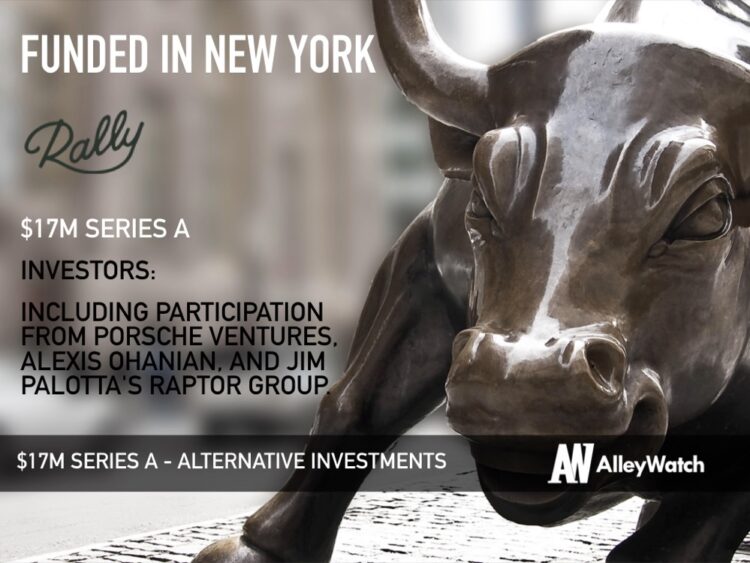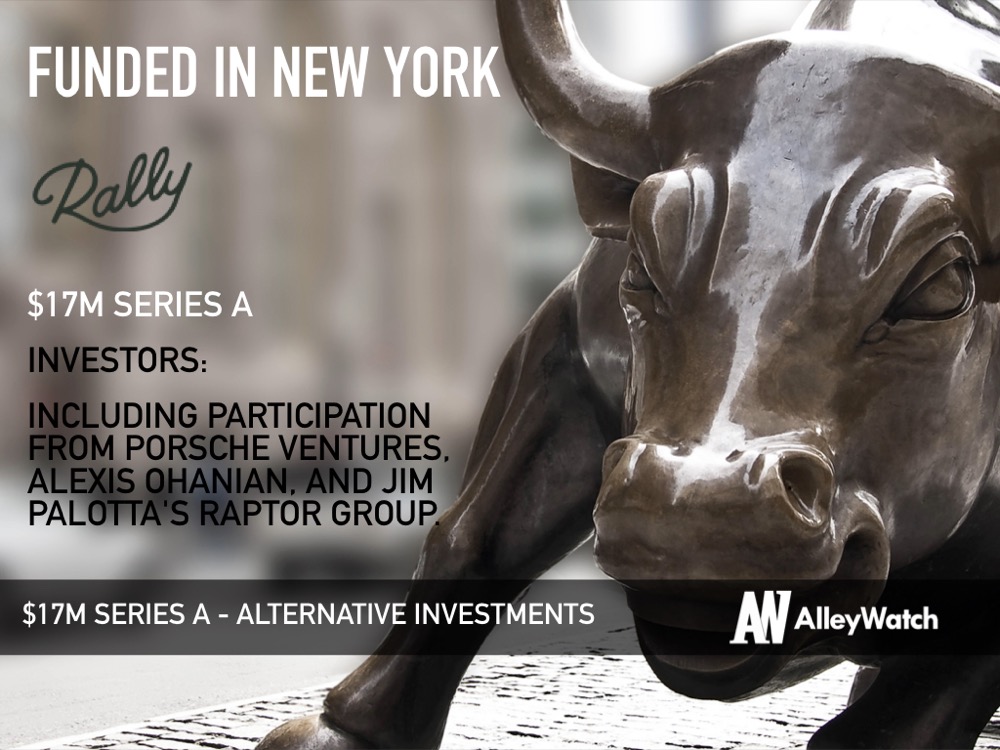Rally is the five-year-old startup that democratizes the ownership of highly-coveted collectibles. This alternative investment platform lets anyone buy/sell ownership stakes in rare items like the 1937 Heisman Trophy (valued at $460K) or a Mike Trout Rookie Autograph Card (valued at $225K). Traditionally these types of investments have been only available to the ultra-wealthy. The platform has no minimum investment and the average user invests around $300 per offering, with shares that can start at as low as $1. Rally charges a small sourcing fee when it acquires an item; this sourcing fee averages approximately 7% of the item cost, far less than industry standards charged by auction houses. With the popularity of the collectible markets surging, Rally now has approximately 200K users, with transactions having grown ~195% in the past 12 months.
AlleyWatch chatted with caught up with Cofounder Rob Petrozzo to learn more about the collectibles market, the company’s future plans, and recent funding round, which brings the total funding raised to $26.9M. In conjunction with this Series A raise, Rally announced its founding CEO Christopher Bruno will assume the role of president while George Leimer (former VP Data Platforms at Disney/ESPN) steps in as the new CEO.
Who were your investors and how much did you raise?
Rally finished an extension of their Series A: $17M in new funding, from cutting edge investors, including Porsche Ventures, Alexis Ohanian, and Jim Palotta’s Raptor Group. The round brings Rally’s total funding to $27M.
Tell us about the product or service that Rally offers.
Rally is a groundbreaking alternative investment platform defining the 21st-century investment portfolio by providing access, liquidity, and transparency to assets historically limited to the ultra-wealthy. Rally sources and securitizes collectibles that have a known provenance, detailed history, and verified authentication. Rally lets anyone buy/sell stock in rare, high-value collectibles just like they would in a public company. There are no minimums, fees, or commissions, and shares start around $25.
What inspired the start of Rally?
We have three cofounders – Chris, Max, and myself. Growing up, we all shared a similar passion for collectible, blue-chip cars, but couldn’t afford to buy several of them at once and start a collection.
About 10 years ago, Chris had to decide between putting a down payment on an investment property or buying two collector-grade cars. Ten years later the property is “flat” while the cars are worth exponentially more than what he would have purchased them for.
This inspired us to come together and create a platform that allowed for fractional ownership – anyone could invest in a piece of these beloved cars, for the very first time. Rally launched in December 2017 with a single car, a 1977 Lotus Esprit.
How is Rally different?
Rally is the first platform to allow non-accredited investors access to passion-led investments that traditionally have been off-limits to all but the ultra-wealthy. The average Rally member invests around $300 per offering, but the platform has no minimum investment and shares are available in assets for as little as $1/share. Rally’s mission is to allow anyone, regardless of age or socioeconomic status, to invest in one-of-a-kind items, with the potential for both emotional and financial returns.
What market does Rally target and how big is it?
The average age of an investor is ~28, but it’s very distributed. Common to have an 18-year old investing alongside an 80-year-old in the same deal. Average spend tends to increase with age – but the average is 28 years old.
What’s your business model?
Rally’s in-house acquisitions team sources one-of-a-kind items from an expansive network of private collectors, dealers, auction houses, etc. Included in each offering is a small sourcing fee, paid to Rally, which generally averages around 7% of the item’s acquisition cost. This is less than half of the industry-standard premiums charged by auction houses and dealers, and Rally is able to leverage its purchasing power and exclusive supplier relationships to bring items to the platform for investors at a lower overall cost than on other secondary markets. Rally charges no commissions, monthly fees, or premiums, or and minimum investments start as low as $1 per share.
How has COVID-19 impacted your business?
Like most venture-backed startups, the beginning of the pandemic was an opportunity for us to take a close look at our overall expenses and make sure we were operating efficiently and on a trajectory that would allow the business to scale long-term. Luckily, we have a great group of investors who support the vision of the company, and we were able to close an oversubscribed funding round during the height of the pandemic, a testament to the team, growth trajectory, and vision/support of our investors.
What was the funding process like?
Many of the new investors in this round have been following the company for a while – when you’re creating an industry like Rally is, it requires investors to have a deeper understanding and buy-in of the long-term vision. We’re glad we were able to bring together a great group of investors who aligned with our vision, saw the future potential in the space, and in Rally’s position as a leader in the space.
What are the biggest challenges that you faced while raising capital?
Raising capital is always tough, especially in a pandemic and especially when you’re the first mover in a new category. Investors don’t have the luxury of looking at an industry that has 10 years of history and competitors to measure you against. As mentioned, it requires a type of investor who takes the time to understand the long-term vision and potential of the company. We were able to find the right investors, tell them the right story, and secure a round that will help us scale and build out the vision.
What factors about your business led your investors to write the check?
First, investors need to believe in the thesis behind the industry Rally is building: alternative investments should be accessible to regular investors, who aren’t super-wealthy, and the overall democratization of finance / investing. If an investor believes in this thesis, the next step is tracking down the companies who are leaders in this space; the companies who are writing the playbook, and inventing the regulatory and technology framework.
We found great investors who believed in this thesis and saw Rally as the clear leaders in the space.
Alternative investments should be accessible to regular investors, who aren’t super-wealthy, and the overall democratization of finance / investing. If an investor believes in this thesis, the next step is tracking down the companies who are leaders in this space; the companies who are writing the playbook, and inventing the regulatory and technology framework.
What are the milestones you plan to achieve in the next six months?
Besides significantly scaling the number of offerings on the platform and types of assets offered, we plan to use the funds to add new partnership programs to unlock exclusive sources of supply, continue building a best-in-class investment platform, and expand its compliance and technical capabilities.
What advice can you offer companies in New York that do not have a fresh injection of capital in the bank?
The hardest part of raising money is finding the right investors, that understand your long-term vision and believe your team is the best to do it. While fundraising is never easy, if you’re talking to the right people who believe in your team and the space then you’re already solving for the two hardest variables when raising money.
What’s your favorite outdoor dining restaurant in NYC
We’ve been lucky to have support early from many of our neighbors in Soho, especially on the Lafayette Street corridor. At the end of the day starting and scaling a technology company isn’t that different than starting and scaling a restaurant – all businesses face the same challenges especially in the early days – hiring, managing burn, and aiming to provide a best-in-class customer experience. We’ve become friendly with so many businesses in the neighborhood – Charley St, Sant Ambroeus, Cafe Belle, Noodlelove, Crosby St Hotel, Cafe Leon Dore, Parisi – the list goes on. Relationships are the best thing about building a business in New York City, and even though we’re building a technology company and they’re building a hospitality brand, we’ve been lucky to have reciprocal support from many businesses in the neighborhood.
You are seconds away from signing up for the hottest list in New York Tech! Join the millions and keep up with the stories shaping entrepreneurship. Sign up today




